Final words and conclusion
Final words and conclusion
You know, I do not think that anyone expected a new SSD in the consumer market from Intel in Q1 2014, especially in the enthusiast class / segment. Still, it made sense, lately all SSDs are in the 450+ MB/sec performance segment, the competition is incredibly steep and that drove prices down. Last year I expected Intel to focus on enterprise class SSDs as the main priority for their storaage solutions department, and they did just that. What I did not expect was for them to bring that server class SSD technology into the consumer market. And that concept works, not only are the 730 SSDs very fast, these offer very important improved endurance. These SSDs are rated at 70 GB writes per day (which is a crazy number for a consumer) and with that write amplitude Intel still backs these SSDs with a five year warranty. To compare a little, currently the industry standard is 10 GB/day for 5 years. So if you apply that logic and write 10GB a day (still a lot) this SSD could surpass 35 years in its span of life. Next to that I personally feel that all SSDs should have some sort of power fail feature, and here Intel excels again as they implemented two 105°C-rated 47 μF capacitors. So if power fails, then the capacitors will deliver power long enough so that all data has been written safely. No more data-corruption after a power outage. This should become a standard feature on all SSDs we think.
With the 730 Intel also has transitioned all their SSDs to 20nm NAND flash memory. It's more cost effective. There is a mix of NAND on the 730 SSDs though, this as well to ensure long endurance and a failsafe, a chunk of NAND is used for over provisioning and parity writing of data. With its fairly high clocks on both NAND and controller the power consumption of the 730 is a little average though, we don't think this will be a great SSD to have inside a laptop as in idle it still uses ~1.5 Watts. But for a desktop, this is a non-issue whatsoever.
Performance
If you place a drive like this into your SATA 3 compatible laptop or SATA 3 compatible PC, you'll have no idea what is about to hit you if you are used to the traditional HDD. We very much enjoy the grand sustained performance of this SSD series, so if you copy a fast amount of compressed data, then the Series 730 will slay and slaughter in performance while making sure your data is safe. Overall this SSD shines at many factors and on many levels, IOPS performance is fairly good. This SSD is writing and reading serious amounts of tiny files in a very fast fashion (until the buffer is full). We stated it before though, IOPS is not something you as a consumer should worry about too much unless you are doing a lot of database related work or create similar workloads on your PC, but this SSD certainly ranks high within this aspect. Sustained write performance is good, not perfect. That is the one gripe we found with this SSD. Trace testing we think is by far the best test in our entire benchmark suite in PCMark Vantage 64-bit. This is a trace test and can emulate what you guys do on your PC but then multiply with factor 100. Sustained read write performance, again good.
Overall SSD usage
An SSD is enjoyable, very much so. As stated, we very much enjoy the grand overall performance of this SSD series, so when you copy a vast amount of compressed data, then the SSD will perform seriously fast in performance. Make no mistake, replacing an HDD with an SSD in your desktop PC or laptop eliminates the random access lag of the HDD head, it is no longer mechanical. That combined with the performance SATA3 offers these days is simply a massive difference and probably the best upgrade you can make for your computer anno 2014.
SATA Controllers
Some overall recommendations then. Should you be in the market for a SATA 3 SSD then we have a couple of hints. First and foremost if you have a SATA2 controller only on your motherboard, then you'll get limited at roughly 270 MB/sec read and writes. SATA3 (6Gbps) will free you up from that allowing the SSD to perform in the 500 MB/sec range. It however is important that you connect your SSD towards the proper controller. We absolutely prefer the performance of the Intel Series 6 and 7 (H67/P67/Z68/Z77/H77/X79/Z87/Z97) integrated SATA 6G controller over anything else available in the market. If you run the SSD from a 3rd party controller with say a Marvell 6G controller, you will see lower performance. The new AMD 85X chipsets also offer fantastic performance. The more recent Asmedia controllers we spotted lately on motherboards are also offering good performance, albeit still 20%~25% slower then Intel's controllers. Also make sure you run your drive in AHCI mode, it does make such a difference in performance -- really guys, a big difference.
Prices HDD versus SSD
First a generic rule that I always apply; you should probably stop looking at the Solid State Disk technology as if it were a traditional HDD. We all will be old and grey before the two reach the same prices or top the multiple TB volume storage the HDD offers for less money. Comparing an SSD with an HDD is making a comparison in-between an integrated IGP or a dedicated graphics card, that last one will cost you a heck of a lot more yet you gain incredible overall performance. It is the very same with an SSD, use it as boot drive on Windows and applications and you instantly have removed a huge bottleneck, namely load and access times. It is a difference in-between night and day (in a proper system). For massive storage like movies, MP3 files and bulky data you do not access on a regular basis, sure that's where the HDD remains the winner as a cheaper storage solution. Guru3D's rule of thumb; the magic simply is finding a good combination in-between the two and balance things out. Use a nice 240GB SSD for your operating system and applications, and park these movies and MP3 files onto a separate TB HDD. That's where the magic happens. I kid you not, all my test systems and work systems run on SSDs, not once have I considered going back to HDDs. The benefits of a good SSD are simply grand. But that doesn't mean I do not understand the budget and cost dilemma that many of you are facing though.
Pricing
As mentioned on page two of this review, we looked up the numbers from some online etailers. Currently only two drives are available for purchase in the USA and EU:
- 240GB costs 200 EUR / 259 USD
- 480 GB costs 410 EUR / 469 USD
Concluding
The Intel series 730 SSD positions itself in a massively saturated market. Now, all SSDs in this class win and lose a little from each other in respective benchmarks, overall it remains to be a lot of the same. Especially once you house that SSD into your desktop PC, the differences will be hard to notice amongst brands in this price-segment. That means manufacturers need to differentiate and that is exactly what Intel is doing with the 730. They took an enterprise class Data-center SSD, tweaked it a bit and released it as their flagship consumer SSD. Now again, performance wise it is hard to tell the real-world difference amongst brands in this class, but what sets the 730 aside is endurance, the life-span has increased over 5x thanks to some clever tricks. Next to that, the added capacitors that will provide the SSD enough time to finish its task when there is a power outage really is key in your data redundancy and safety. This is the next logical step in NAND flash storage solutions, increasing life-span, ensuring data integrity and all that at blazing fast speeds. By implementing all this Intel manages to deliver a very fast, capable and reliable product here. To back up their claims you receive a 5-year warranty. At a price of sub 200 EUR for a 240 GB model we'll have to see how popular the 730 series really will become, though we feel that people will find the price premium a very worthwhile investment for their data in the long-term. And heck, it is lovely in terms of storage performance and as such comes recommended.
Now then, PCIe M.2 and SATA Express anyone ?
- Sign up to receive a notice when we publish a new article
- Or go back to Guru3D's front page



